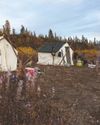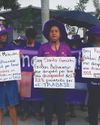Protesters of the Site C dam in the Peace River Valley are facing a civil suit from bothBC Hydro and the B.C. government.

In January 2016, farmers and First Nations members set up a peaceful two-month winter camp in an effort to stop the $10.7 billion Site C dam on B.C.’s Peace River. The dam would flood 145 kilometres of the river and its tributaries, destroying hundreds of archeological and heritage sites – including Indigenous burial grounds – as well as some of Canada’s richest farmland and critical habitat for dozens of species vulnerable to extinction. Third-generation farmers Ken and Arlene Boon are among 70 Peace River Valley residents who will lose homes and property to the dam. Esther Pedersen will also lose her house and property.
Helen Knott and Yvonne Tupper are members of Treaty 8 First Nations whose traditional territory includes the Peace River Valley. The area slated for flooding is the last remaining stretch of valley still available to First Nations for traditional practices guaranteed to them in a treaty their ancestors signed in 1900. The rest of the valley, along with much of the surrounding region, has been taken up by industrial development.
Two weeks after the camp was established at the Rocky Mountain Fort heritage site, scientist David Suzuki and Grand Chief Stewart Phillip, the president of the Union of B.C. Indian Chiefs, visited the remote location by helicopter to support the campers.
One week after David Suzuki and Grand Chief Stewart Phillip visited the Rocky Mountain Fort camp, BC Hydro filed an injunction and enforcement order to remove the encampment and proceed with logging. The campers had fully expected an injunction, but they were unnerved when B.C.’s Liberal government, in an unprecedented turn of events, also authorized the law firm of Fasken Martineau DuMoulin (since renamed Fasken) to launch a civil suit against five of the campers and a camp supporter, all but one of them women.
هذه القصة مأخوذة من طبعة March/April 2018 من Briarpatch.
ابدأ النسخة التجريبية المجانية من Magzter GOLD لمدة 7 أيام للوصول إلى آلاف القصص المتميزة المنسقة وأكثر من 9,000 مجلة وصحيفة.
بالفعل مشترك ? تسجيل الدخول
هذه القصة مأخوذة من طبعة March/April 2018 من Briarpatch.
ابدأ النسخة التجريبية المجانية من Magzter GOLD لمدة 7 أيام للوصول إلى آلاف القصص المتميزة المنسقة وأكثر من 9,000 مجلة وصحيفة.
بالفعل مشترك? تسجيل الدخول

PLATFORMS FOR PEOPLE, NOT PROFIT
Digital platforms boast that they’ve “democratized” cultural production. But what would truly democratic platforms look like in Canada?

ORGANIZING THROUGH LOSS IN THE HEART OF OIL COUNTRY
The story of climate justice organizing in Alberta, at the heart of the tarsands, is the story of a group of young activists learning what it means to lose, and keep on fighting

GROWING THE LABOUR MOVEMENT
How unions are using community gardens to engage members, nourish communities, and help strikers weather the picket line

A NEW ERA FOR OLD CROW
In the Yukon’s northernmost community, the Vuntut Gwitchin First Nation is reckoning with how to preserve their land and culture, amid a warming climate and an influx of tourists

“At Least Hookers Get Wages”
The risky business of sex work in the gig economy

The Literal – And Literary – Futures We Build
Briarpatch editor Saima Desai talks to two judges of our Writing in the Margins contest about Idle No More and MMIWG, ethical kinship, writing queer sex, and their forthcoming work.

The Cost Of A T-Shirt
In Honduras, women maquila workers are fighting back against the multinational garment companies that they say are endangering their health and safety.

Milking Prison Labour
Canada’s prison farms are being reopened. But when prisoners will be paid pennies a day, and the fruits of their labour will likely be exported for profit, there’s little to celebrate.

Bringing Back The Beat
In mainstream media, labour journalism has been replaced by financial reporting and business sections. But journalism students are raising the labour beat from the grave.

There's No Journalism On A Dead Planet
Corporate media owners are killing local newspapers – which is making it impossible for everyday people to understand the on-the-ground impacts of the climate crisis